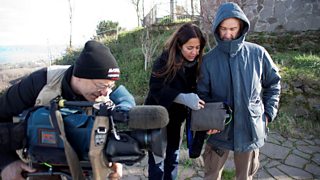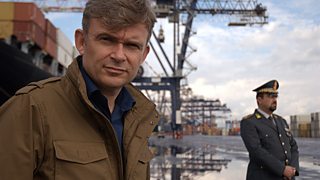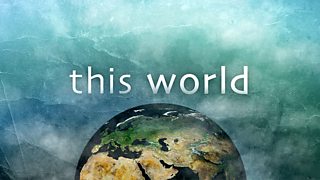Making The Mafia's Secret Bunkers
Elena Cosentino, producer and director of The Mafia's Secret Bunkers, on the making of the film.
The filming in Calabria began in the middle of the night in a convoy, three cars packed with men in camouflage, red berets and assault rifles in hand. We'd been granted rare access to the Cacciatori, the Hunters, a special unit of Italy's Carabinieri whose task is to track down fugitive mafiosi.

But, this was in the 21st century, for heaven's sake. Not a war zone.
As Mafia expert and historian John Dickie and I drove through the quaint villages of the isolated Aspromonte mountain range, the commander in charge, Lt Angelo Zizzi, happened to mention he had once been deployed for six months to Afghanistan.
His gentle, understated demeanour was at odds with his special ops tales. Of laying flat for days in manmade ditches to surveil suspects with night-vision telescopic lenses. Of carrying one's bodily waste around in special bags, so not to leave any traces behind - in enemy territory. Of a long-running battle for hearts and minds.
But he wasn't talking about Afghanistan. He was talking about Calabria.
"We can only take you to some of the 'Ndrangheta bunkers under cover of darkness’, he apologized ‘We really cannot afford to upset the local population by being seen to bring strangers to these areas. For a long time, people here were almost entirely on the side of our opponents, organised crime".
When our convoy finally got to our destination, the mountain village of Plati, it was still pitch black and eerily quiet.
Armed with torches and headlights, we followed the Cacciatori, as they crept into a dilapidated, abandoned house in the centre of town. Under the bottom step of a staircase there was a hidden opening. Beyond was a network of tunnels, secret passages, hideouts and bunkers. Increasingly, fugitive bosses of the local Mafia, the , have taken to absconding, and even living, in similar types of hideouts, as Italian authorities have finally woken up to this powerful and secretive Mafia, and begun to hunt for them.
Thrilled and bewildered, we crawled down, one by one, into the underworld, where millionaire mafiosi choose to hide like rats.
My first scouting trip to Calabria, in March last year, had started very differently. First impressions had been of awe for the dilapidated beauty of Calabria's coastline.
The last outpost of Italy's mainland, the pretty city of Reggio Calabria overlooks the stretch of sea that separates the continent from Sicily.
Perpetually shifting air currents and cloud systems generated by the mighty Etna volcano, towering across the strait, make for the most pictorial sunsets ever seen in Italy. Each tiny white pebble on the sea bed could be seen through crystal clear waters.
With a little effort you think, this could easily be paradise. But then there is 'Ndrangheta.
Later in the day an experienced and laconic policeman – in plain clothes and an unmarked car - took me to scout the place where a particularly ingenious 'Ndrangheta bunker had been found. A fully furnished two-bedroom flat built underneath a warehouse in the middle of the countryside. Police had discovered the access through a platform that lifted up from the ground through a hydraulic lift. Perfectly concealed to hide a top boss, this was a hideout worthy of a Batman villain.
Once at the site, I was gagging to get in. But my excitement was soon to evaporate. Within five minutes, a battered Mercedes appeared out of nowhere and slowed down as it drove past us. The policeman fidgeted with his mobile phone. Another five minutes, the Mercedes drove back, past us again. More fidgeting. Third time, and the policeman figured we'd better go.
"There's nothing to fear, really" the policeman explained. " It's just that they consider this their turf and, unless we come here with evidence to arrest a boss, there's little point in ruffling local feathers by lingering too long".
Us and them
It soon dawned on me why there are practically no substantive documentaries, in Italy, let alone abroad, about a Mafia like the 'Ndrangheta, whose presence was palpable at every turn in Calabria but, really, they are nowhere to be seen.
Still largely under-reported in Italy, and therefore virtually unknown to the outside world, the Calabrian 'Ndrangheta had been allowed to grow unchallenged into the most powerful of Italy's Mafia syndicates, ruling this forgotten corner of Europe in a quasi-feudal fashion through intimidation, corruption and silence.
In his interview for our film, top anti-Mafia Public Prosecutor Michele Prestipino cautioned us against the narrative of 'Ndrangheta as a rural, even folkloristic local phaenomenon. The underground bunkers are a fitting metaphor, he agreed, because they are symbol of the entrenchment that allows bosses to retain control over its territory and its people. But the 'Ndrangheta is today an international crime syndicate moving billions around the world. It's most dangerous when it ‘hides in plain sight’. Among those one does not suspect in politics, business and civil society.
"If you want to make a serious film, go show that "grey area" he advised, helpfully.
That was all very good. But how do you show that on telly?
Related clips
-
![]()
John Dickie uncovers the truth about Itay's most powerful organised crime group.
-
![]()
Read more articles from the producers and directors of This World.


